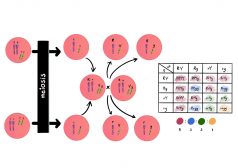Definition
noun, plural: gene amplifications
The process of duplicating a particular gene, causing the gene to increase in frequency inside the cell, as well as amplifying the phenotype (e.g. the proteins) that the gene confers (or code for)
Supplement
Gene amplification is the process of duplicating a specific gene. This amplification increases the frequency of the gene inside the cell. Consequently, it also leads to the amplification of the phenotype (e.g. the proteins) that the gene confers (or code for). Thus, gene amplification is a means through which a gene can be over-expressed.
Gene amplification that occurs naturally may be due to mutations. Errors in DNA replication and repair can result in mutations. A mutation is a change in the nucleotide sequence of a gene or a chromosome. Some of the events that may lead to gene amplifications include unequal crossing-over between misaligned homologous chromosomes during meiosis, retrotransposition, aneuploidy, polyploidy, and replication slippage.
Gene amplification is also linked to drug resistance in cancer cells where amplification results in cells being prevented from absorbing the chemotherapeutic drug. Thus, it is induced artificially, particularly through polymerase chain reaction technique.
Synonym(s):
- gene duplication
- chromosomal amplification
See also:







